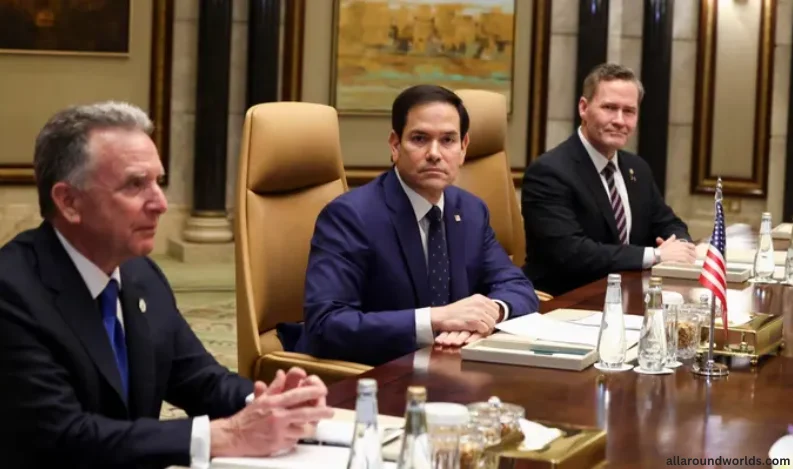
US, Russia to Appoint Negotiation Teams for Ukraine Peace Talks
Washington/Riyadh: The United States and Russia have agreed to appoint negotiation teams to work toward ending the ongoing conflict in Ukraine, marking the first high-level engagement between the two nations since the war began in 2022. The discussions took place in Riyadh, Saudi Arabia, on Tuesday, but did not include representatives from Ukraine or the European Union.
Despite the diplomatic progress, no concrete plans for a direct meeting between U.S. President Donald Trump and Russian President Vladimir Putin were established. "It is still difficult to talk about a specific date for a meeting between the two leaders," stated Yuri Ushakov, Putin's foreign policy aide.
Concerns Over Potential Concessions
The negotiations have raised concerns among European leaders, who fear Washington may make significant concessions to Moscow, potentially altering Europe's security landscape. Some worry the talks could lead to a Cold War-style agreement between the superpowers at the expense of Ukraine’s sovereignty and territorial integrity.
U.S. Secretary of State Marco Rubio and Russian Foreign Minister Sergei Lavrov reached an understanding to form high-level negotiation teams. According to a statement from the U.S. State Department, the two sides agreed to "establish a consultation mechanism" to address challenges in U.S.-Russia relations and lay the groundwork for future cooperation.
Moscow provided fewer details about the discussions, stating only that the two sides "outlined their principled positions" and agreed to appoint negotiation teams in due course.
Russia’s Security Demands
The Kremlin emphasized that any resolution to the Ukraine conflict must involve a reconfiguration of European security agreements. Russian officials reiterated long-standing demands for NATO to withdraw from Eastern Europe, viewing the alliance as a strategic threat.
"A lasting and viable resolution is impossible without a comprehensive consideration of security issues on the continent," Kremlin spokesperson Dmitry Peskov told reporters. Before launching the full-scale invasion of Ukraine in February 2022, Moscow had demanded NATO roll back its presence in Central and Eastern Europe.
Ukraine Excluded from Talks
While European leaders scrambled to present a united front in an emergency meeting in Paris on Monday, Ukraine was notably absent from the Riyadh discussions. Ukrainian President Volodymyr Zelensky, speaking from Turkey on Tuesday, asserted that he was not invited and firmly rejected any negotiations conducted without Kyiv’s direct involvement. "I will not recognize any agreements about us without us," Zelensky stated.
For its part, Russia appears eager to restore diplomatic ties with the U.S. and re-establish itself on the global stage. The Riyadh meeting began without visible gestures of goodwill, such as handshakes, signaling the deep tensions that remain between the parties.
Uncertain Prospects for Peace
Both Washington and Moscow downplayed expectations of an immediate breakthrough, acknowledging that negotiations would likely be a prolonged process. "We are discussing how to start negotiations on Ukraine," Ushakov explained to Russian state media.
Trump has repeatedly stated his intention to end the war in Ukraine but has yet to propose a detailed peace plan. U.S. officials have signaled that both sides must be prepared to make concessions if peace talks are to be successful. However, Russia has firmly rejected any notion of relinquishing territory it has seized in Ukraine.
In a notable shift, the Kremlin stated that while Ukraine has the "right" to join the European Union, its NATO aspirations remain unacceptable. Additionally, while Putin expressed a willingness to negotiate with Zelensky, he questioned the Ukrainian leader's legitimacy, citing the expiration of his five-year term—despite Ukrainian laws allowing the suspension of elections during wartime.
EU and China Weigh In
As Trump administration officials continue to indicate a softer stance on Moscow, the European Union remains uncertain about its role in potential peace talks. European Commission President Ursula von der Leyen reiterated the EU’s commitment to Ukraine, saying, "Financially and militarily, Europe has brought more to the table than anyone else. We want to partner with the U.S. to deliver a just and lasting peace for Ukraine."
Meanwhile, China cautiously welcomed the renewed diplomatic efforts. "At the same time, we hope that all parties and stakeholders can participate," Chinese Foreign Ministry spokesperson Guo Jiakun stated on Tuesday.
Despite deep-seated tensions and skepticism from various quarters, Russia has expressed cautious optimism about the potential for meaningful negotiations. The formation of dedicated negotiation teams may mark the beginning of a complex and challenging path toward peace in Ukraine.



Recent Comments: